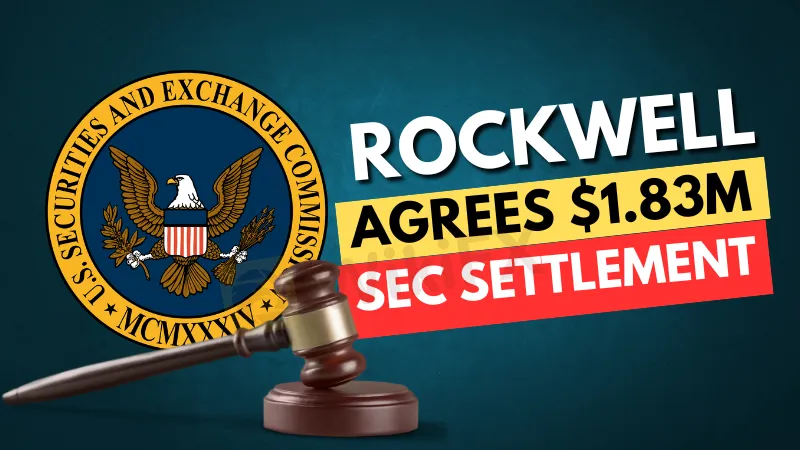简体中文
繁體中文
English
Pусский
日本語
ภาษาไทย
Tiếng Việt
Bahasa Indonesia
Español
हिन्दी
Filippiiniläinen
Français
Deutsch
Português
Türkçe
한국어
العربية
Rockwell Agrees $1.83M SEC Settlement
Abstract:SEC settles for $1.83 million with Brian Sewell and Rockwell Capital over a fraudulent scheme involving 15 students and the non-existent Rockwell Fund.

The US Securities and Exchange Commission settled with Brian Sewell and Rockwell Capital Management for $1.83 million after accusing Sewell of defrauding 15 students of $1.2 million. The case has brought attention to the risks associated with cryptocurrency investments, especially when they come with unverified claims of cutting-edge trading strategies.
The issue originates from Sewell's establishment of the American Bitcoin Academy, an online course that claimed to teach students the subtleties of bitcoin trading. In early 2018–mid-2019, hundreds of his students believed in the Rockwell Fund. This hedge fund was projected to be a game-changing investing platform that would leverage AI and crypto-asset trading algorithms to generate high profits for its investors.
However, the SEC's inquiry into these assertions revealed a quite different reality. The inquiry proved that Sewell's claims were hollow: the Rockwell Fund never existed, and the complex trading tactics he spoke about were never established or applied. The cash gathered from the 15 pupils, totaling roughly $1.2 million, was redirected into Bitcoin ventures. The Bitcoins were stolen from Sewell's digital wallet, causing the assets to be lost.

Given these findings, the SEC filed a lawsuit against Sewell and Rockwell Capital Management for breaching federal securities laws' anti-fraud provisions. The case highlighted the importance of regulatory supervision in the fast-growing cryptocurrency market and the risk of substantial losses from misinformation-based investments.
Sewell and his company settled rather than contest the SEC's allegations. They agreed to pay $1.83 million in fines and prejudgment interest to settle the fraud charges against them. This settlement compensates the affected students and deters future fraud.
The SEC's Division of Enforcement Director, Gurbir S. Grewal, underscored the misleading nature of Sewell's acts, including false guarantees and nonexistent technology that Sewell utilized to entice investors into his scam. This example advises investors against high-return investments, especially in volatile and opaque cryptocurrencies. They should be cautious and critical to avoid such frauds.
Keep up with financial trends, expert opinions, and major developments at https://www.wikifx.com/en/news.html. Click now to stay ahead of the competition!

Disclaimer:
The views in this article only represent the author's personal views, and do not constitute investment advice on this platform. This platform does not guarantee the accuracy, completeness and timeliness of the information in the article, and will not be liable for any loss caused by the use of or reliance on the information in the article.
Read more

PH Peso vs US Dollar: Will It Hit P60 in 2025?
Philippine peso forecast 2025: Will it hit P60 vs US dollar? Key factors include Fed rate cuts, BSP policies, trade deficit, elections, and global trends.

Top Cryptocurrency Exchanges for Staking 2025
Best crypto staking platforms for 2025 highlighted. Key features include staking rewards, fee comparisons, and options for Ethereum and other cryptocurrencies.

Is it a good time to buy Korean Won with the current depreciation?
The exchange rate of the South Korean won in 2025 is expected to be highly uncertain, influenced primarily by the dual challenges of economic slowdown and political instability.

Terra Founder Do Kwon Denies Fraud Allegations in U.S. Court
Do Kwon, the founder of the Terra Luna cryptocurrency ecosystem, has pleaded not guilty to multiple fraud charges following his extradition to the United States.
WikiFX Broker
Latest News
Ghana Trader Jailed for $300K Forex and Crypto Scam
US Dollar Surge Dominates Forex Market
Hong Kong Police Bust Deepfake Crypto Scam Syndicate Involving $34 Million
Is it a good time to buy Korean Won with the current depreciation?
Pepperstone Sponsored the "Aston Martin Aramco Formula One Team"
XRP Price Prediction for 2025: Will It Hit $4.30 or More?
Exnova Scam Alert: Account Blocked, Funds Stolen, and Zero Accountability
T3 Financial Crime Unit Freezes $100M in USDT
BlackRock Bitcoin ETF Outflows Hit $332M in Single Day
Terra Founder Do Kwon Denies Fraud Allegations in U.S. Court
Currency Calculator






